#terence t d'arby
Text

Might as well
#jjba#jojo’s bizarre adventure#jojos bizarre adventure stardust crusaders#agents of dio#jjba midler#jjba steely dan#jjba rubber soul#jjba kenny g#terence t d'arby#jjba n'doul#shittys jojo shitposts
470 notes
·
View notes
Text
i’ve seen conflicting thoughts…
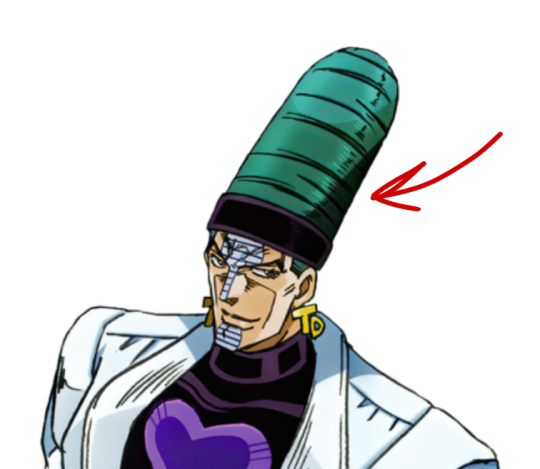
guys i know it’s hair because "LoOk UnDeR tHe HeAdBaNd" pls stop being mean to me
#spankz polls#jjba poll#jjba#stardust crusaders#terence t d'arby#(ok to rb)#idk what to tag this i just wanna know what y’all think lol
111 notes
·
View notes
Note
please draw jar jonahead! lmao
sure i'll draw that
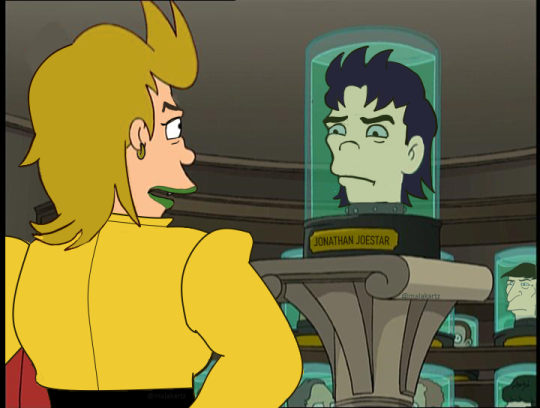

#having to put watermark to funny edit in case someone reposts (you can with credit) but credits ai instead#jjba#dio brando#jonathan joestar#terence d'arby#terence t d'arby#jojo edits#jojo redraw#futurama
320 notes
·
View notes
Text
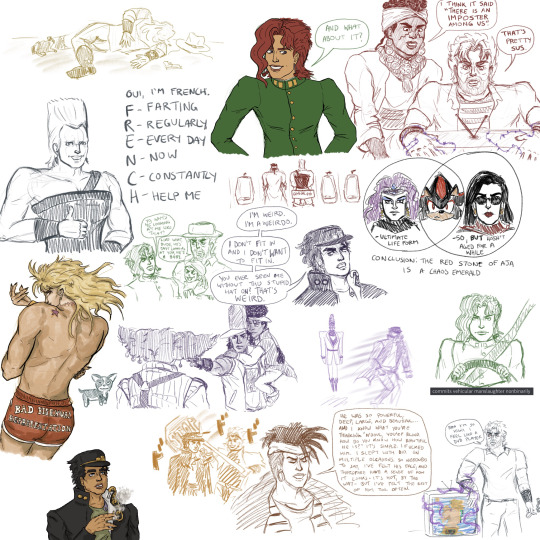
it occurred to me while backing up procreate files last night that aside from Bad Bisexual Representation Booty Shorts Dio, i never posted any of the things from this canvas i had going for sketches while watching part 3 back in 2022, which is a shame, really
#jojo's bizarre adventure#stardust crusaders#jotaro kujo#joseph joestar#kakyoin noriyaki#jean pierre polnareff#muhammad avdol#dio brando#hol horse#n'doul#oingo and boingo#terence t d'arby#alessi jjba#with a special shoutout to lisa lisa kars and shadow the hedgehog#context for the oingo boingo alessi one: i was like ''damn it must suck being an eight year old with severe anxiety in the same cult mansio#as Loser Dude Who Beats Up Children For Fun'' and then thought of that image#context for the terence darby one is that he levitates sometimes and that shits creepy in a hilarious way#also ''commits vehicular manslaughter nonbinarily'' is also just something i said on discord (about yoda actually)#but for some reason kakyoin would often end up being the one driving. and i think he should be allowed to run over some of dio's minions#i think everything else here speaks for itself#OH also the enya and polnareff ''can't stand his fake ass/me and the bestie'' was drawn on this canvas too but on hidden layers#jojo no kimyou na bouken#jojo part 3
26 notes
·
View notes
Text
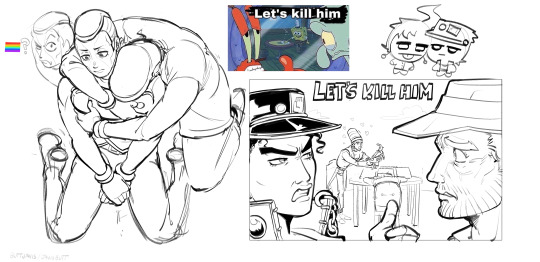
gay ppl
#my art#jjba#nijimura okuyasu#higashikata josuke#kujo jotaro#joseph joestar#kakyoin noriaki#terence t d'arby
227 notes
·
View notes
Photo

D’Arby and his new toy ❤️ I’m continuing with these board book pages and hopefully will finish them up in a few months 🙂 I’d really like to have this all printed up by the end of this year :)))
#jojo's bizarre adventure#jjba#jjba fanart#jjba part 3#stardust crusaders#terence t d'arby#kakyoin#kakyoin noriaki#children's book illustration#jotaro
193 notes
·
View notes
Note
What does everyone in the mansion think of jonathan?
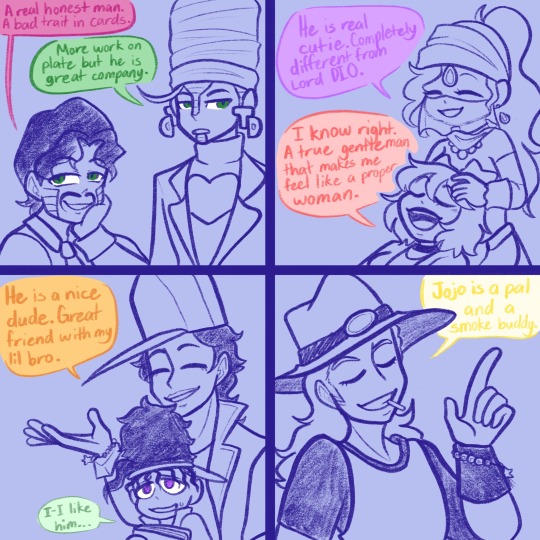

Artist note:
A few days ago: Me struggling to draw Enya
I get overwhelmed drawing a bunch of different characters at once or in one project.
#vampire jonathan#jojo au#jjba au#jjba#jojo's bizarre adventure#jjba part 3#jojo part 3#vampire jonathan joestar#enya the hag#n’doul#jjba oingo#jjba boingo#hol horse#jjba kakyoin#terence t d'arby#daniel d’arby#midler jjba#mariah jojo
111 notes
·
View notes
Text
Transgender gamers.
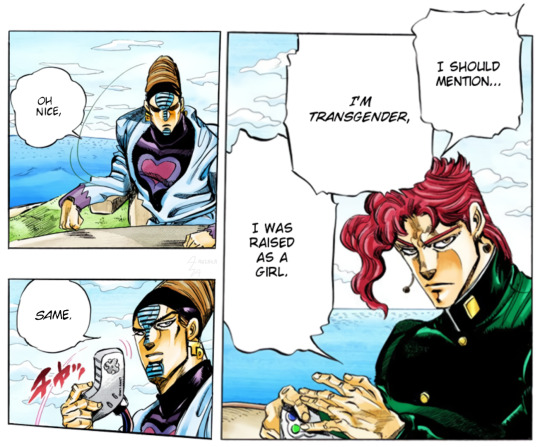
#jjba#jojo's bizarre adventure#jojo no kimyou na bouken#stardust crusaders#noriaki kakyoin#telence d'arby#telence t. d'arby#terence t d'arby#both of them are transgender#araki told me personally#transgender gamers#so cool
56 notes
·
View notes
Text

sdjfpsjfdpejfpj i cant stop-
#jjba#jojo bizarre adventure#daniel d'arby#telence t. d'arby#terence t d'arby#digital art#meme#is that your fucking fursona
7 notes
·
View notes
Text
even souls lie
Daniel and Terence D'Arby, at intervals of five years.
(d'arby brothers, 7.2k words. content warnings for child abandonment and somewhat graphic violence. crossposted on ao3.)
1968.
When Daniel’s parents had first told him, grinning to tears on the living room couch of their tiny San Francisco apartment, that they were having a second child, he had entertained some grand illusions of what that actually meant. They had been excited, after all, so why shouldn’t he be? Adults almost never got this animated, so surely that meant he should be happy, too.
The months that followed had been a rush of anticipation, too fast and too slow for his fourth grader’s brain to handle—pushing the stroller around on the carpet while he waited for dinner, bragging to the children in his class, making colored pencil drawings of what his brother’s stand might look like. The prospect alone of having a second person in the world who could see his Osiris, the way his mother assured him the baby would be able to, was enough to keep Daniel up at night, long after he was supposed to be asleep.
The actual process, apparently, is less glamorous than he’d thought. His mother goes into labor in the middle of a Thursday night, and at first he’s happy to be out and about at midnight—midnight!—but the novelty only lasts so long.
He falls asleep in the hospital lobby at some point, then wakes up early the next morning to find that the baby still isn’t out yet, so he returns to the delivery room, as if the process will go by faster if he keeps an eye on it. The doctors try to stop him from going back in, but his father insists, so he leans up against the far wall, craning his neck and marveling nervously at the bloodiness of it all. His mother kind of sounds like she’s dying, but his father assures him she isn’t, and after a few minutes of that, he fishes one of his books out of his father’s work bag and entertains himself with that instead.
When the baby is finally born, Daniel is so absorbed in his book that he almost misses it entirely. Something catches his ear, though, whether it’s a word of excitement from his father or a particularly loud gasp from his mother, and he rushes back to the bedside in time to see—
A little red thing, resting gently in the nurse’s hands. The sight of it is almost scary—it’s all shriveled and wrinkled-looking, with raw skin and smears of blood on its misshapen body. His parents are so happy that they’re sobbing (something that Daniel has always thought to be some sort of contradiction), but their 10-year-old son doesn’t see what’s so great about it, honestly. He had been expecting something that looked more like baby Jesus in that movie they watch every Christmas. He hadn’t been expecting it to be ugly.
He frowns as he watches the nurses swaddle the baby and hand it back to his mother, who cradles it in her arms with a tired joy. He wonders how she isn’t as disappointed as he is—after all, she’d been screaming like a murder victim for seven hours for this.
“Do you want to hold him, Daniel?” his father asks, still leaned over his mother’s side.
“Sure,” Daniel answers with feigned enthusiasm, reaching his hands out.
His father carefully lifts the baby from his mother’s arms and then places it into Daniel’s. Looking down at it, he doesn’t see much of a reason to change his stance—especially since the little monster is screwing its face up and letting out a whiny shriek almost as soon as he’s holding it. He scrunches his nose up in distaste.
His father laughs, placing a hand on Daniel’s shoulder. “We’re naming him Terence. What do you think?”
“He looks like a monkey,” Daniel answers honestly.
1973.
Daniel watches his father storm out the door and then retreat down the sidewalk to his beat-up car with a sort of bitter triumph. His cheeks still sting, but the black-and-silver patches of skin and the horrified look on Martin’s face had been worth it.
He turns to the mirror hung on the dining room wall and leans his face up close to it, examining how the tattoo looks on his face—silver ink appearing almost metallic against the peach of his face, straight black lines dividing it into equal strips, just like he had always imagined it. Definitely worth the months of saving up his winnings. His father has almost given up on asking him where he gets the money for these things; after all, what can he do about it? He’s too busy working overtime at the mechanic’s to investigate, and he can’t punish Daniel because he needs him to take care of Terence. He leans away from the mirror, satisfied fingers still tracing over the ink.
“Terry,” he calls, “I’m making mac and cheese for dinner.”
His brother rounds the corner into the dining room so quickly that he must have been waiting on the other side. His light brown hair is cut too short to be messy, and he’s dressed simply in the plain t-shirt and shorts that Daniel used to wear when he was younger. His eyes are narrow with curiosity.
“What kind?” Terence asks.
“The kind you like.” Which is, luckily, also the cheapest kind. Thank god for Kraft dinner.
“Good.” He follows Daniel into the kitchen. “Are you in trouble, Dan?”
Daniel huffs out a laugh and opens the cupboard. “Of course not. Martin’s pissed, that’s all. You shoulda seen the look on his face.”
“Why?”
“‘Cuz it was funny.”
Terence stares at him. “What did you do?”
“Oh. Here, I’ll show you.” Daniel turns towards his brother, crouching down so that their faces are level, and points at his cheek. “Look—it’s a tattoo.”
Terence takes this as an invitation to press his cold little hand against Daniel’s face, and Daniel swats it away. Sure enough, though, the ink doesn’t smudge.
A gasp escapes the kid’s mouth. “Wow.”
“Right?” Daniel echoes, standing back up. “It looks even better like this than when I was just drawing it on with markers.”
“Do mine,” Terence orders suddenly, clambering over to his chair at the kitchen table.
Daniel goes to get the markers from the dining room, and when he returns, Terence is still standing next to the chair, staring up at him.
“Dan, pick me up,” he orders.
Daniel crosses his arms. “Why?”
“Put me on the chair.”
“Do it yourself.”
“I want you to do it.”
“Come on, Terry. You’re a big boy, aren’t you?”
Terence glares at him thoughtfully for a moment before turning and climbing up onto the chair. It wobbles under him on its unsteady legs, and he grips the back of it for support.
Daniel approaches his brother’s side and uncaps the black marker. He starts by outlining the shape on Terence’s chin, then on his nose and up to his forehead. Terence keeps his eyes closed, chin tilted up as Daniel colors the shapes gray, then marks them with horizontal black lines. He’s slow, careful to keep them as straight and even as possible, and he’s satisfied when he pulls away to see that he’s more or less succeeded.
“Done,” he announces, capping the black marker.
Terence blinks his eyes open. “I wanna see.”
Daniel hoists Terence up by his armpits and carries him, legs dangling, into the dining room. He presents him in front of the mirror and watches Terence examine the faux tattoo with his pale eyebrows drawn seriously together.
“Second line is wrong,” he tells Daniel.
Sure enough, the second line from the top of his forehead is just slightly crooked. Daniel shrugs his shoulders, setting Terence back down. “No, it’s not. It’s fine, Terry.”
“It’s wrong. Fix it.”
“I told you, Terry, it’s fine. The mirror just made it look weird.”
“Are you lying?”
“So what if I am?” Daniel asks, heading back into the kitchen.
“Don’t lie,” Terence mutters, following him.
“It’s just a drawing.”
“So is yours.”
“No, mine is a tattoo, so it’s permanent.”
“I want a tattoo, too.”
Daniel laughs, pulling the box of Kraft from the cupboard. “You’re too young for a tattoo, Terry.”
“No, I’m not.”
“Yes, you are.”
“You said I was a big boy,” Terence complains, pulling himself back up onto his chair.
“Big enough to get on your chair by yourself, not big enough to get a tattoo. There’s a difference.”
“When will I be big enough to get a tattoo?”
“When you can walk into a tattoo shop by yourself and not get told to leave,” Daniel tells him with a smirk. “Or when Martin lets you get one—fat chance!”
Terence is quiet for a moment. Then: “Why do you call dad Martin?”
“Because it’s his name. I don’t call you ‘brother,’ do I? No, I don’t. So why should I call him ‘dad?’”
“Everyone else does.”
“Well, I’m special.”
“Can I call him Martin, too?”
Daniel’s smirk widens. “He’d hate that. So sure, why not?”
“Why don’t you like him?”
Daniel pauses, not turning to face his brother. Finally, he says, “Because he’s a square.”
“He’s not a square,” Terence replies scornfully. “He’s a bunch of shapes, not a square.”
“It’s a figure of speech. It just means that he’s lame.”
“Did you like him more when mom was alive?”
It’s an innocent question. Terence is still only five, Daniel tells himself, and even his stand hasn’t shown any powers yet—he can’t mean anything by it.
But it’s sore. Daniel barely remembers how Martin had acted after the accident; all he can recall is the vague image of his father holding his two-year-old brother in his arms as he huddled over the side of Daniel’s hospital bed, expression obscured by the haziness of his memory. They had moved up to Stevenson after the funeral, so that Martin could be closer to his family—family that barely came to see them after the first week anyways, especially once Martin started working. Now Daniel barely sees him, either—it’s funny, really. Daniel makes enough money now in his endeavors that Martin shouldn’t need to work so much, but Martin doesn’t need to know that. No, it’s better that his father keeps busy. Better that he doesn’t know. Better that he doesn’t have time to ask questions.
Daniel sets a pot in the sink.
“Not really. He’s always annoyed me.”
1978.
The city lights flicker outside Daniel’s window, cold and impersonal against the blacked-out sky, just the way he likes it. The cars moving ant-like below his hotel balcony provide only a vague reminder that human life exists outside his little enclave, too distant to be meaningful. The summer night air passes pleasantly against his cheeks, and he lets out an easy breath. He’s been almost entirely nocturnal ever since he left Stevenson over a year ago, dwelling in seedy bars and dazzling casinos, but he’s at liberty to turn in early every so often. After all, what’s the point of living if not to follow one’s whims?
He slides the window shut and steps over to the armchair, his house robe swishing around him. Sometimes, on nights like this, an invoiceable lack gnaws at him from the back of his mind. He hasn’t had a consistent companion ever since John took off almost a year ago now—not that it matters, really. It doesn’t matter at all.
Daniel pours himself a glass of bourbon and sits down, reaching for the television remote. The screen flicks on to a news channel, a dark-haired woman sitting in front of a blue background.
“...for their children,” she’s saying. “Parents in this small Washington town, however, have had to do just that.”
Daniel’s thumb hovers over the channel button. Instead, he sets the remote down on the side table, leaning back in his seat.
“At least seven children between the ages of nine and 11 have turned up dead in Stevenson, Washington, in the past two months alone. In each case, the child was reported as missing days before his or her body appeared, often in secluded parts of town. All but two of the children were boys, and all but one came from low-income families. All seven attended Columbia Gorge Elementary School.”
Numb, Daniel watches the still, familiar image of a stout, brown-brick building drift onto the screen. He takes a sip of his bourbon.
“At first glance, this may appear to be the work of a serial murderer. The autopsy reports, however, have stumped police.”
The school building is replaced by the white starkness of what seems to be a police station, where a man in uniform is seated in front of the camera. Daniel doesn’t read his name.
“The bodies show no signs of foul play,” he says. “There are no wounds, no abrasions, no bruising. We haven’t found any traces of poison. All their organs seem like they were in good shape. It seems like all seven of the children suffered sudden cardiac death, but none of them had any record of underlying health conditions that might contribute to… to SCD.”
“The question, then, is what could be causing these tragic deaths. Police have closed Columbia Gorge Elementary indefinitely to investigate, just days before school would have ended for the summer,” the woman’s voice interjects as the school building appears again, this time as a video. A pale, gray-haired man with deep eye bags is in front of the camera, wringing his hands together like they might fall off if he doesn’t. He must be standing in the parking lot—behind him, teachers are ushering children outside to where their anxious parents must be waiting.
“It’s awful—awful,” Principal Woronov is saying with a voice so taut it might snap. “We’re cooperating with the authorities, of course. If there’s something in the school that could be causing an illness—causing something that could be hurting our children, we need it taken care of. We can’t let our kids be put in danger. It’s an awful, awful situation, and there are so many questions. Why those seven went missing, for instance, and where they were before their bodies were recovered—there just hasn’t been any closure. Not for us, and certainly not for the families. Hopefully the authorities are able to get to the bottom of this soon, and hopefully we’re able to help. We just want…”
Suddenly, Woronov’s words flicker out, smothered by an acute pounding in Daniel’s ears. Behind the principal’s stooped frame, a small figure passes by under the guidance of a middle-aged teacher. The child is maybe nine years old, with a mop of light brown hair and a familiarly striped t-shirt. For anyone else, it would be difficult to make out through the pixels of the TV screen, but Daniel can see it clearly: Carefully marked on the boy’s chin, nose, and forehead is a mess of gray lined with black.
For just a moment, Terence glances at the camera. His eyes are disinterested, cold.
One of his brother’s classmates had gone missing in a similar manner just days before Daniel had left town. He had pushed it out of his mind almost religiously, and he certainly hadn’t mentioned it to Terence, but he could remember how it felt the first time he had clutched one of those little poker chips in his hand, shaking with sick excitement and all the adrenaline of any 14-year-old boy who had just won a game. For him, it had been the beginning of a career—a passion, a lifestyle. But Terence had only been nine when that boy had gone missing. Terence had only been nine, and he had watched Daniel with too much admiration.
Admiration and, at times, irritation—that glint of anger aimed right at Daniel as Atum loomed over his younger brother’s shoulder. Liar, liar, liar. Why can’t you ever tell the truth? But the answer had been obvious, hadn’t it? Of course Daniel couldn’t tell Terence the truth. Of course he couldn’t tell Terence where he went at night, where he got his cash from, why he sometimes appeared in the early morning with twitching hands and bloodshot eyes. Of course he couldn’t. Besides, it wasn’t in his nature to tell the truth.
And Terence found out anyway.
Daniel had been planning to leave regardless; Stevenson was small, and his ambitions were big. Terence had just made him more sure—Terence and his watchful eyes, Terence and his admiration. Terence and the drawings on his face.
He changes the channel.
If Terence wants to get away with much more, he’ll need to change his methods—and he’ll need to figure that out on his own.
1983.
It’s late afternoon now. Daniel takes a slow, steady breath and knocks on the door to his father’s house.
When he left, he had never intended to return—there hadn’t been anything left for him in that building, after all, and the world outside held so much. If he did return, he wouldn’t do so for a long time. And then, suddenly, it had been a long time: Daniel had realized, finishing another row of poker chips in his book, that he had left home over five years ago. For another year after that, he had turned the idea of returning about in his mind without really committing to anything, and then he had found himself trailing a target in Portland. The drive would barely even be an hour.
On a whim, he had decided to do it; if the wind had been a bit stronger, if he had been a bit more hungry, if a person on the sidewalk nearby had caught his eye, he might not have gone at all. He had made his decision, though, and now here he is.
Daniel stands on the doorstep so long that he begins to wonder if his family is gone despite the car in the driveway. Just as he’s beginning to contemplate leaving and returning to Portland for a few more days, the door swings open.
In the past six years, Daniel has changed a fair bit; his skin has tanned, his hair has assumed a clean middle part, his mustache has tidied up, his wardrobe has been remade entirely. He’s certainly not as skinny as he used to be. Terence, on the other hand, has transformed. Most noticeably, years of growing have stretched him a head above Daniel even though his back is hunched, and his limbs are left knobby and long. His light brown hair hangs limply around his cheeks and stops at his chin, kept out of his eyes with a black fabric headband. He must have outgrown all Daniel’s old hand-me-downs, because he’s dressed in unfamiliar jeans and a heart-patterned sweater. What strikes Daniel the most, though, is Terence’s face. His skin is pale, spotted awkwardly with acne and zits, lips chapped and cold blue eyes glaring at him from under a few stray hairs.
Those drawings are still on his face, after all these years. It doesn’t take Daniel long to see what they are.
“Nice tattoos,” he offers weakly. All of a sudden, his strength seems to have left him.
Terence stares at him for a moment, silent, before his mouth twists into an unpleasant smile. “They look better on me. What are you doing here, Daniel?”
“Just paying my family a visit. Mind if I come in?”
Again, Terence is silent, his blank eyes baring coldly into Daniel’s skin. Finally, he steps aside, gesturing for Daniel to enter.
The living room and dining room look almost identical to how they did six years ago, Daniel notes as he glances around, suppressing a pang of nostalgia that threatens to grip him. The carpet is more worn. The mirror on the wall is foggy. The chairs in the dining room are new, and one of them has a backpack slung over it. That’s all.
“How’ve you been, Terry?” he asks, seating himself on the creaky old couch.
“Fine,” Terence responds robotically, shutting the door behind them. “What about you? Have you been living it up without me?”
Daniel leans back in his seat, doing his best to look relaxed and comfortable. On the contrary, though, something about Terence’s demeanor makes him uneasy—and Daniel hasn’t felt uneasy in a very long time. The feeling is too alien, too disorienting.
“You could say that,” he replies smoothly, trying (and, he believes, succeeding) to look and sound more calm than he feels. “For what it’s worth, it seems like you’ve done the same. How many souls have you collected by now?”
“What do you mean?”
“Don’t play games with me, Terry. I know what you’ve been up to.”
At the sound of his old nickname, Terence’s entire body jerks as if someone had shot him. He stares at Daniel silently for one second, two, three, with wide, empty eyes, before suddenly—finally—there is a change. A wide, wide grin stretches his face open, splitting the chapped lines on his lips, and he lets out a hoarse laugh. It’s an unpleasant noise, scratchy and dry and shaking louder and louder until Daniel almost thinks Terence has lost his mind entirely.
It trickles away as soon as it has started, though, giving way to the odd giggle. Terence shakes his head.
“You know what I’ve been up to? I don’t think you do. Do you think I have a neat little line of poker chips tucked away in a book in my dresser drawer? You must’ve thought you were smart to install that false bottom. No. You’re not as smart as you think you are, Daniel, and you can rest assured that we’re not the same. If you’re so sure that you know what I’ve been up to, then I’ll show you.”
Every instinct in Daniel’s body is telling him that that sounds bad, but more than that, a sick, cat-like curiosity has left him immobilized. He doesn’t move from where he’s reclined on the couch. “Go ahead, then.”
Terence’s grin widens so far that it almost looks painful. “I will. And, by the way, don’t ever call me ‘Terry’ again.”
He spins on his heel, walking over to the backpack in the dining room and unzipping. Daniel watches him closely as he rummages around in its main pocket and then draws upright with something small and partially obscured in his hand. He turns back to Daniel and approaches him, presenting him with the little object.
It’s moving, Daniel realizes, twitching stiffly and whining like a thing in the throes of death, and at first he thinks it’s some sort of small animal. As the gears turn in his mind, though, he sees that it isn’t an animal at all—it’s a doll. Its hair is brightly colored and spiked up into a disproportionate mohawk, and its little body is dressed in a miniature black jacket and torn jeans. The fabric, from the body to the clothes, seems to have been sewn together by hand, although the quality is undeniably good (to Daniel’s untrained eye, at least).
The little head jerks unnaturally and its gasping voice raises into words.
“C’mon, D’Arby, just let me go! Are you listening? You can’t keep me like this forever. They must be looking for me now. Just let me—”
Terence gently places his fingers over the doll’s mouth, giggling to himself. He returns it quickly to his backpack and turns back towards Daniel.
“Did you see that?” he crows. “He doesn’t realize yet that he’s never getting away—that’s because I just got him two nights ago. I had to drive all the way up to Tacoma for him, too. His band isn’t that big yet—and now it never will be, not without its singer. I was hoping for someone more famous, but I take what I can get. I guess that’s why you left, too, Daniel? Well, what I’m doing is much more interesting. You should hear the way they talk to me after a few months. You’d almost think they loved me.”
He’s completely insane.
Daniel’s stomach turns, but he won’t lose his composure so easily. Instead, he keeps his gaze fixed levelly on Terence, just like he had throughout the entire exposition. Evenly, he answers, “I’m not so sure ‘interesting’ is the word I’d choose.”
“Oh? Then what word would you choose?”
“Creepy,” Daniel answers, a rare show of honesty.
Terence’s mouth twitches. “‘Creepy?’ It’s not creepy. You, of all people, should be able to understand that.”
“I understand the appeal of gambling for souls, of course,” Daniel responds with a shrug. “Keeping them conscious and letting them talk to you? That’s quite another thing. They’re trophies, Terry, not prisoners—and certainly not companions. You shouldn’t get personally attached to them. It makes you look like a madman.”
In a single, flurried motion, Terence lunges towards Daniel. He grabs the collar of his brother’s shirt, knuckles twitching against the soft fabric, and bares his teeth like a dog. Daniel keeps his expression relaxed, disinterested. Most importantly, unintimidated.
His heart, though, is pounding in his chest like a kick drum. The reality that this deranged thing is what’s become of his younger brother twists sick horror at his stomach, and a nagging thought at the back of his mind asks if this could have been avoided if Terence hadn’t been left to his own devices for so long.
But no. It’s too late for that.
“I told you to stop calling me that,” Terence snarls. “You don’t have any right to call me that—and you don’t have any right to tell me what to do, either. You don’t have any right to walk into this fucking house anymore. This isn’t your home, and I’m not your family. You’re not needed anymore.”
Daniel looks at him and, halfway between a taunt and a realization, says, “But you used to need me.”
Terence punches him in the face.
As Daniel’s head jerks back from the force of the blow and pain explodes around his eye, he realizes that he probably shouldn’t have said that, but in the moment, he just hadn’t been able to resist. He hadn’t expected Terence to be so strong—he hadn’t really expected Terence to hit him at all—but he finds himself sprawling back against the couch, too shocked to react immediately.
Before he can collect his bearings, Terence has grabbed him by the collar again, lifting him up and shoving him to the ground. Daniel’s able to brace a knee against the floor so that he doesn’t fall entirely, but in that moment, his brother’s foot drives hard into his stomach. All the air in his body seems to escape him and he doubles over, gasping and almost choking. The next kick lands on his ribs, and he falls.
Over and over again, Terence slams his foot against Daniel’s body with a strength that seems to dwarf his gangly frame. His chest, his arm, his chin—each screams at him that he needs to run or fight. Finally, he’s able to grab hold of the carpet, half-dragging half-pulling himself paces away from Terence, for all the good it does him. He’s found himself on the west-facing side of the living room, with his route to the door and the stairs blocked by his brother. To flee, he has to first get around Terence.
Worse than that, he can’t seem to find the will to fight. As strong as Terence seems, Daniel must be heavier than him—but he can’t seem to push himself up, can’t seem to raise a hand to do anything other than protect his face. He knows how to defend himself; he’s done it before. But now, despite the pain and the fear, something he’s never felt before has taken hold of him in a grip strong and dizzying enough to paralyze.
Once, he had held a baby Terence in his arms. He had watched his first step, heard his first word. He had shown his young brother his stand, the way his mother had done for him. He had cut his hair and cooked for him and taken him to school and read to him and drawn matching pictures on their faces. He had driven his beaten-up truck out of their driveway on a cold February night and he hadn’t looked back even once. He had created something horrific—something worse than even himself.
“It was my own fault,” he finds himself rasping in a voice that doesn’t sound like his.
Terence just laughs. Daniel sees him toss his head back and laugh so hard that his body shakes, stepping even closer to his prone brother. Even now, he resembles the boy Daniel used to know—the eyes, the nose, the cheeks. Maybe this is who he always has been; maybe Daniel just never noticed. Maybe Daniel hadn’t paid enough attention.
“Say that all you want. It doesn’t matter now,” Terence wheezes, kicking Daniel’s arm away from his face. “You’re familiar with death, right, Daniel? You watched our mother die, after all, even though it should have been you. Your little poker chips are as good as dead. Well, I want you to listen to me very carefully.”
He leans over, shoving Daniel’s arm to the ground. As he stands back up, he places his foot on top of Daniel’s fingers even despite his brother’s weak struggling and looks him in the eye.
“There are things worse than death,” Terence says carefully, “and I’m going to show you what they are.”
He drives the heel of his shoe down into Daniel’s fingers until, somewhere in the weak din of Daniel’s mind, he hears a crunch. Then another. Then another.
At some point after Terence pulls him partially upright to punch his face in again, Daniel feels his mind slipping away. He almost doesn’t hear the sound of the door open, or the sound of his father’s voice cutting through the room. When he comes to his senses in the hospital, he wonders why he came back to Stevenson at all.
1988.
Daniel finds DIO’s mansion lacking in terms of interior design, but he’d never say that.
You’d think that a man so unfeasibly rich would have a more trained eye for style, but apparently not. Certain rooms are littered with piles of gold and jewels and other treasures intermingled with the bodies of DIO’s victims, and while the bold display of wealth and violence is a fair choice, Daniel can think of at least ten ways off the top of his head to do it in a more interesting way. Outside of the gold heaps, almost every room in the building has the same dreary, dark feeling to it, suitable more to a horror movie than a man’s house (or a cult’s headquarters, because that’s really what this is). Even the lodgings for DIO’s other servants—in which Daniel chooses not to dwell, for what it’s worth—seem coffin-like.
Whoever DIO’s interior designer is, Daniel thinks as he wanders up the stairs to the mansion’s second floor, must not be the same person as his tailor. The garish yellows and greens, adorned with hearts and belt loops and odd curls, are nowhere to be seen on the walls or the carpets. The first time he had seen DIO, he would have been amused if he hadn’t been so afraid. He still fears his vampiric overlord (although “boss” would really be a more accurate word), but he wonders about his choices sometimes.
Strangely enough, Daniel finds himself standing at the doorway to what appears to be a dimly-lit costume room. The rows of hangers seem to go on forever, each supporting costume after costume of bright colors and luxurious fabrics, although it’s difficult to make out in the dark. Daniel steps forwards and begins perusing one of the rows, lazily inspecting each outfit with eyes that have swiftly grown accustomed to the dim lighting.
Some might say that it’s a bad idea to go snooping around the sprawling mansion of a menacing vampire, but if Daniel is going to be working underneath another person for the first time in his entire life, he’s of course going to familiarize himself with the terrain. There are other stand users who live here, yes, and even more who come and go, but even the most sadistic of them know not to attack another of DIO’s servants unprovoked—after all, DIO is employing them all for a reason. Even DIO himself shouldn’t have any reason to fault Daniel for this; it isn’t like there’s anything particularly suspicious about the costume room.
“What are you doing in here?”
Daniel raises his head at the sound of the voice, apparently coming from the other side of this row of costumes. He takes one costume in each of his hands and pushes them away from each other to peer through to the other side. The glare of his younger brother, glinting white and blue through the dark, greets him.
Daniel blinks. “Trying on DIO’s outfits, of course. What about you?”
He can faintly see Terence’s features twist into a scowl. “I’m fetching a costume for Lord DIO—Lord DIO, Daniel, not just ‘DIO.’ Remember your place.”
“Right, right.” Daniel releases the costumes he’d been holding out of the way and walks around to meet Terence on the row over. “Who makes these outfits, anyways?”
“I do,” Terence answers with a smirk. “You ought to learn how to recognize my handiwork. Lord DIO pays me lots of compliments over it.”
“I’m sure he does. He must love mustard yellow,” Daniel drawls.
Terence’s mouth twitches. “I wouldn’t expect you to have any aesthetic sensibilities, anyways.”
“I have eyes.”
“Oh, shut up,” Terence snarls. “Why do you have to loiter around here? If I had known Lord DIO was planning on employing you, I would’ve warned him against it. You’re not worthy of kissing the ground he walks on.”
“I’m not here to quarrel with you, Terry. This feud we have is entirely one-sided; I don’t care for it.” Daniel leans back against the end of the beam that supports the nearest row of costumes. “Besides, if you’re worth DIO’s time, we both are. We have the same ability, more or less, except I’ve been using mine for longer.”
“Please. The only thing you have that I don’t is your lies—which aren't any use on me, if you’d forgotten.” Atum shimmers into existence over Terence’s shoulder.
Daniel scoffs. “You can’t cover everything with yes or no questions.”
“But it’s more than you can do.”
“Who says that? Maybe Osiris has another ability, too.”
“It doesn’t.”
“I can communicate telepathically with cats.”
“Can you really?” Atum stares at him.
Daniel lets out a huff of laughter. “Of course I can.”
Terence scowls. “Fuck off. Can’t you leave me alone?”
“You’re the one who interrupted me while I was exploring,” Daniel answers with a yawn. “Why don’t you run along and bring Lord DIO his ugly yellow suit?”
A flash of anger passes over Terence’s face. “You’d better be careful, Daniel, or I’ll tell him you’re talking badly about his clothes.”
“And admit to him your handiwork got made fun of? Come on, Terry, you’re all talk. Didn’t you tell me once you’d show me something worse than death? I don’t think a few broken ribs and fingers are worse than death—unless death is nicer than I’ve heard.”
“I don’t know, Daniel. Did our mother’s death look nice to you?” Terence laughs angrily. “Besides, a few broken ribs isn’t what I was talking about. Trust me, I’m going to show you something worse than death—I just haven’t yet. You’ll wish you had died in her place once I do, and you can rest assured of that.”
The inclusion of their mother would have been upsetting if Daniel hadn’t grown used to Terence’s jabs over the last few months. “Nice one, Terry. And here, I thought you wanted people to think you were the better brother.”
“Luckily, I don’t need to prove the truth,” Terence spits. He folds the costume over his arm, turning to leave, and then pauses to send another angry look Daniel’s way. “And, by the way, don’t talk to Vanilla Ice again. She doesn’t like you. She told me so.”
“Vanilla Ice? Which one is that?” Daniel blinks, feigning confusion. “Oh, right. The former stripper. Don’t worry, Terry, I won’t interfere with your love life.”
Terence glowers at him. His done-up beehive of hair makes him look ridiculous, and suddenly Daniel is reminded of how meaningless this entire exchange is. He sighs, adding, “Come to think of it, I passed by her in the library. She wanted to see you.”
“Really?” Terence asks, eyes lighting up. “Well, I need to deliver this costume. Don’t show your face around here again unless Lord DIO summons you.”
With that, he disappears out the door, and Daniel hears his footsteps as he descends down the stairs.
He really should’ve had Atum double-check that one.
1993.
Daniel wakes up, shaky and hot in the darkness of his room, at two in the morning. His blankets are tangled uncomfortably around him and his skin is damp with sweat.
He can’t quite remember what he had been dreaming about, just a still-fresh sense of nausea and panic pounding at his ears. That could mean anything—almost every night for the past few years has brought visions of his mother, of Terence, of DIO, of Kujo Jotaro. More than a few show his victims, and those are worse. If someone had told him five or 10 years ago that he’d be living like this in 1993, a constant shadow of guilt and horror, he wouldn’t have believed them, but maybe it’s for the better. No, not maybe—it is for the better. Out of all the things he wants, to go back to who he was when he was in his prime isn’t one of them.
His nightmares have grown less frequent ever since he and Terence returned to their apartment from the road trip they’d taken a year ago. That’s something, at least. Hol Horse is only 15 minutes outside town, too. Rubber and the others are even closer. Everything he needs is within reach.
After all, someone else is closer still—someone who he’d rather not disturb at this hour of the night.
Carefully, with hands that haven’t yet stopped trembling, Daniel pulls the blankets off of his body. He lowers himself softly to the ground and goes out into the hallway, walking gently so that he doesn’t make too much noise. When he gets to the kitchen, though, he spots a figure sitting hunched over the table.
“Terry?”
Terence turns his head to look at Daniel. In the darkness, he looks older than he is, like an elderly man at 25 years. He sighs. “Why are you up?”
“I was going to get something to drink. Can I turn the light on?”
All he gets is a shrug in reply, so Daniel goes over to the light switch and flicks it on. He clears his throat. “Want some tea?”
Again, Terence shrugs.
Daniel hesitates, then decides to take that as a yes. Within the minute, a kettle of water is warming on the stove. He isn’t bold enough to take a seat, so instead he leans back against the refrigerator, hands clasped awkwardly together. Hesitantly, he asks, “Why are you up, Terry? Have you been sleeping okay?”
“You know I haven’t been,” Terence mutters. “I never have.”
“Sorry.”
“Forget it. I’m not upset.”
Still, his voice offers no further questioning, so Daniel falls uncomfortably silent.
Surprisingly, that isn’t the end of it. After a moment, Terence adds reluctantly, “I was going to get myself something to eat, but I started feeling sick, so I sat down. That’s all.”
“You feel sick?” Daniel asks, looking up. He doesn’t even try to stop the worry from edging into his voice. “Are you okay?”
“It’s fine. I’m just tired.”
“Have you slept tonight?”
“No,” Terence admits.
“Last night?”
“No,” he repeats, almost indignant.
“When was the last time you did?”
“I don’t know,” Terence snaps, “Thursday? I told you, Dan, it’s fine.”
“You should go to bed, Terry,” Daniel frets.
“Listen, I don’t feel sick anymore. It’s been an hour or so since then.”
“So you’ve been sitting here in the dark for an hour, doing nothing? That—that really can’t be a good sign. You should go to bed.”
Terence’s mouth twitches. “I thought I was supposed to be the one looking after you. That’s the whole reason we started living together. You haven’t forgotten, have you?”
“Of course I haven’t. But a lot has changed since then, Terry,” Daniel supplicates. “I’m doing better than I was a few years ago—and I have you to thank for that. I can at least make myself useful.”
It’s an exaggeration, really, to say that Daniel has Terence to thank for his recovery; there had been some days where just looking at his brother had been too painful to bear, and Terence’s odd bursts of rage and spite hadn’t helped. But things aren’t like that now, and the same guilt still chews so powerfully on Daniel’s thoughts and memories that he almost really believes it. He really is grateful that his brother is here—that much, at the very least, is true.
“You’re right; a lot has changed,” Terence echoes unhappily.
Daniel looks back at him questioningly.
Terence shifts in his chair as if he’s suddenly grown uncomfortable. “You’re going to leave sooner or later, aren’t you? Probably sooner rather than later. Don’t try to tell me I’m wrong—we both know it’s true. This was never going to last forever.”
“I’m not leaving, Terry.”
“Don’t lie to me,” Terence snaps, voice wavering. “I’m not some child who you can keep secrets from, Dan. I know you. I can tell. You’ve been spending an awful lot of time with the—with Hol Horse. You’ve been spending a lot of time with Hol Horse lately.”
Ah.
Daniel makes his way around the table to rest a hand on Terence’s shoulder. His brother doesn’t react, so he says, “I don’t have any plans to move out right now. Really. And if I do decide to move out, I won’t ever be far away. You’re an important part of my life.”
“As if I have any reason to believe you.”
It hurts to hear Terence say that; Daniel has tried his best to mend things with his brother over the past few years, including the obvious baggage between them. Not that Terence has any obligation to forgive him. But, then, this is Terence, who has always looked for cutting remarks when he gets upset. Daniel shouldn’t take it personally, and he certainly isn’t going to try to defend himself.
Instead, he offers with a weak smile, “If I did anything that would hurt you, Rubber would hunt me down and kill me, so that’s one reason.”
Terence’s expression doesn’t change; he hardly seems to hear Daniel at all. Instead, he slumps over even further.
“I just wish I could have been enough.”
Daniel’s heart aches.
“You’ve always been enough, Terry.”
Terence makes a noise that at first Daniel thinks is a strange sob. As his head hits the table, he realizes that it was a snore. All of a sudden, his brother has finally fallen asleep.
19 notes
·
View notes
Text

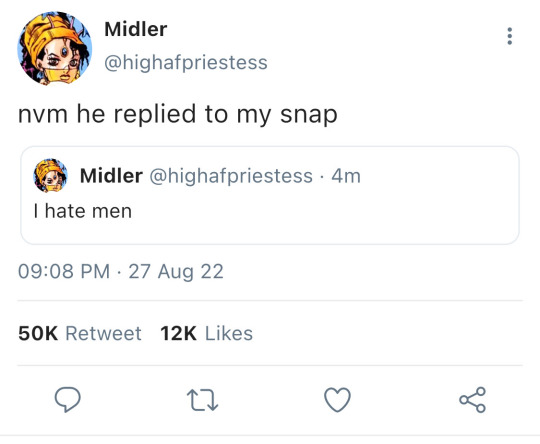

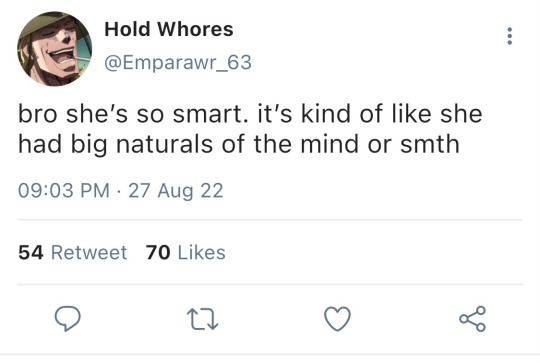

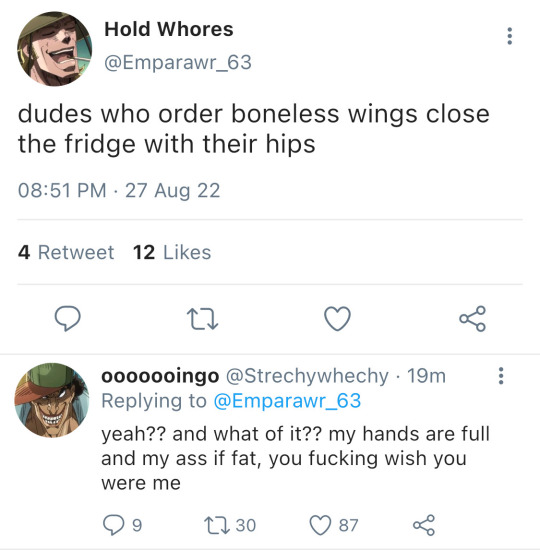
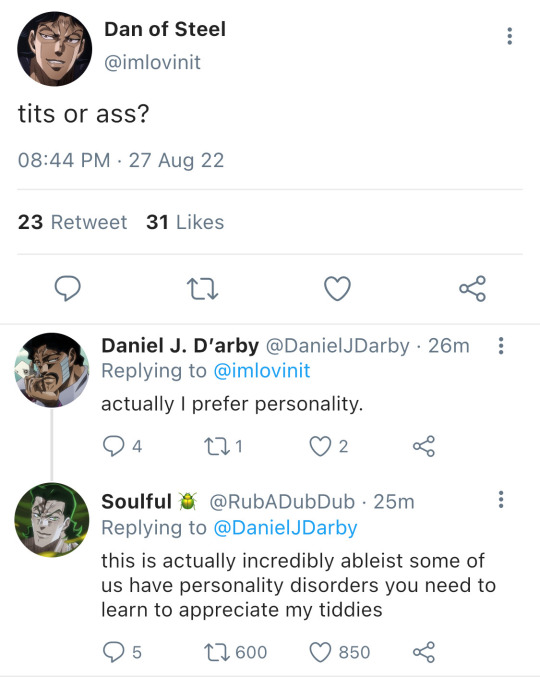
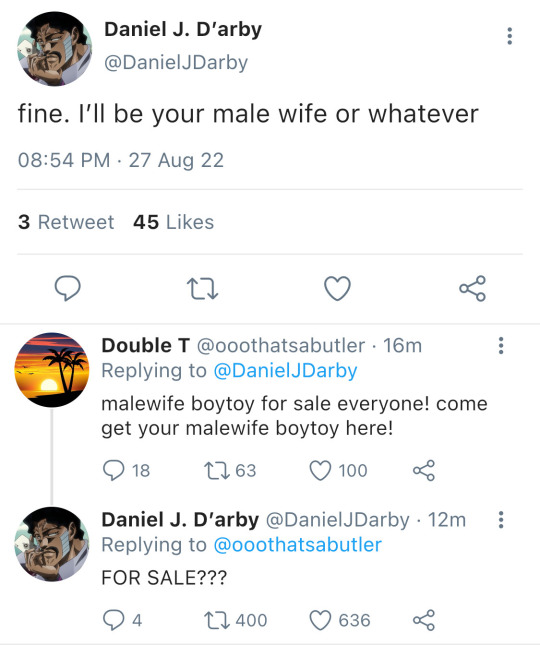
Daniels lying he’s actually a boob guy
#jjba#jojo's bizarre adventures#jojo's bizarre adventure stardust crusaders#agents of dio#hol horse#dio brando#terence t d'arby#daniel j d'arby#jjba mariah#jjba midler#jjba oingo#jjba rubber soul#jjba steely dan#fake tweets#shittys jojo shitposts
283 notes
·
View notes
Text
What if they added Terence D’Arby to ASBR but because he’s a pro gamer, he’s self aware and knows he’s in a game. So instead of using his stand (which isn’t suited for combat) he just starts doing classic fighting game moves.
#terence t d'arby#agents of dio#jojo’s bizarre adventure#stardust crusaders#all star battle r#jjba#sdc#asbr
52 notes
·
View notes
Text
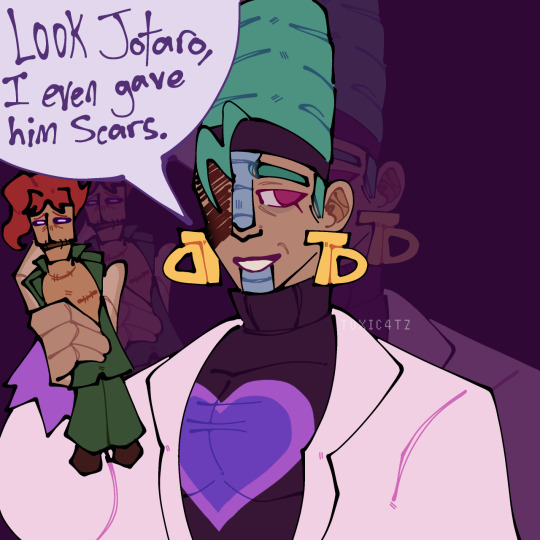
Love the detail but youre still weird for trapping human souls in dolls 🤨 anyways look at this man, love him
#jjba#jjba fanart#jojos bizarre adventure#stardust crusaders#terence t d'arby#kakyoin noriaki#T0X's art
48 notes
·
View notes
Text
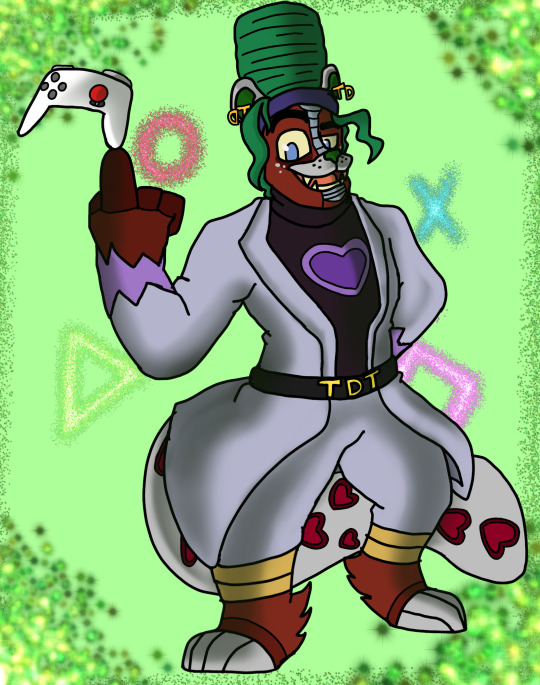
Art trade for @bara-bean
Requested me to draw Terence D'Arby, but he is a Hyena x Snow Leopard.
Sorry for the delay, but hope you like it ;p
Thank you for the trade, been fun-
#terence t d'arby#jjba#jjba part 3#stardust crusaders#jojos bizarre adventure#furry#hyena#snow leopard#art trade#digital art#playstation buttons#he is just being a gamer#thanks ;p
9 notes
·
View notes
Text
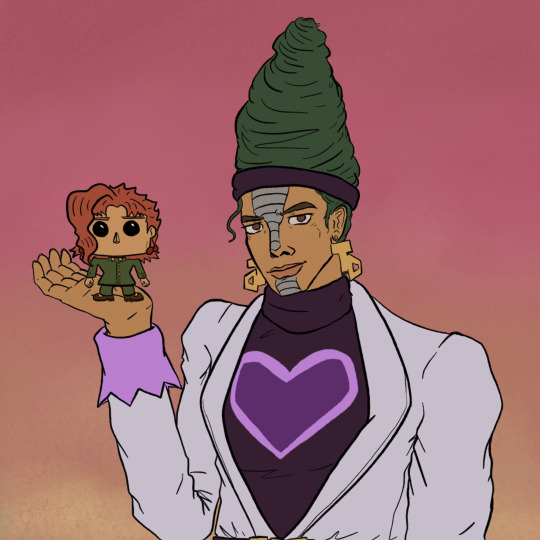
gamer on gamer violence
#jojo’s bizarre adventure#stardust crusaders#terence t d'arby#noriaki kakyoin#kakyoin noriaki#jojo no kimyou na bouken#jojo part 3#sorry your boyfriend was too gamer and we turned him into a funko pop. Yeah he’s a vinyl bobble head now.#fun fact while looking up a colour reference i noticed that terence’s eyebrows are a similar colour to his brother’s hair and not his own#which means he dyes his hair green which is so much fun to think about
90 notes
·
View notes
Text
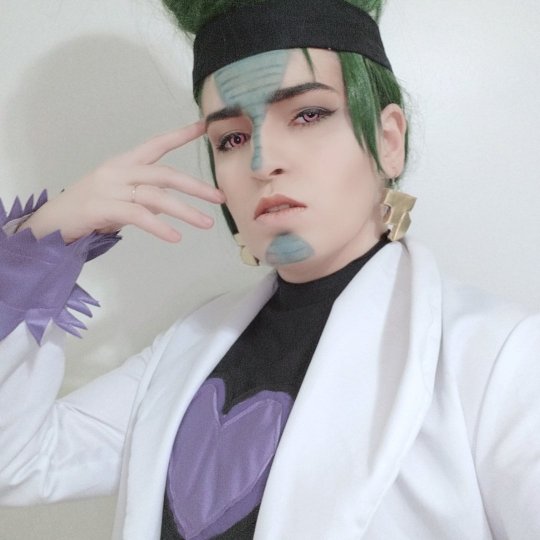

Gamer and Gambler
#captain's face#my cosplay#didn't post these two together here did I?#terence t d'arby#daniel j d'arby#JJBA#stardust crusaders
44 notes
·
View notes